From age 2 to age 12, your child’s teeth will go through a transformation. They will first experience getting their full set of baby teeth, which will then be replaced with a set of adult teeth over the years.
How many teeth does a child have in each of these stages? It depends on any given point in their life, but it’s somewhere between 20 and 32! Here’s an overview of your children’s teeth and how they change as they grow.
Baby Teeth (Primary Teeth)
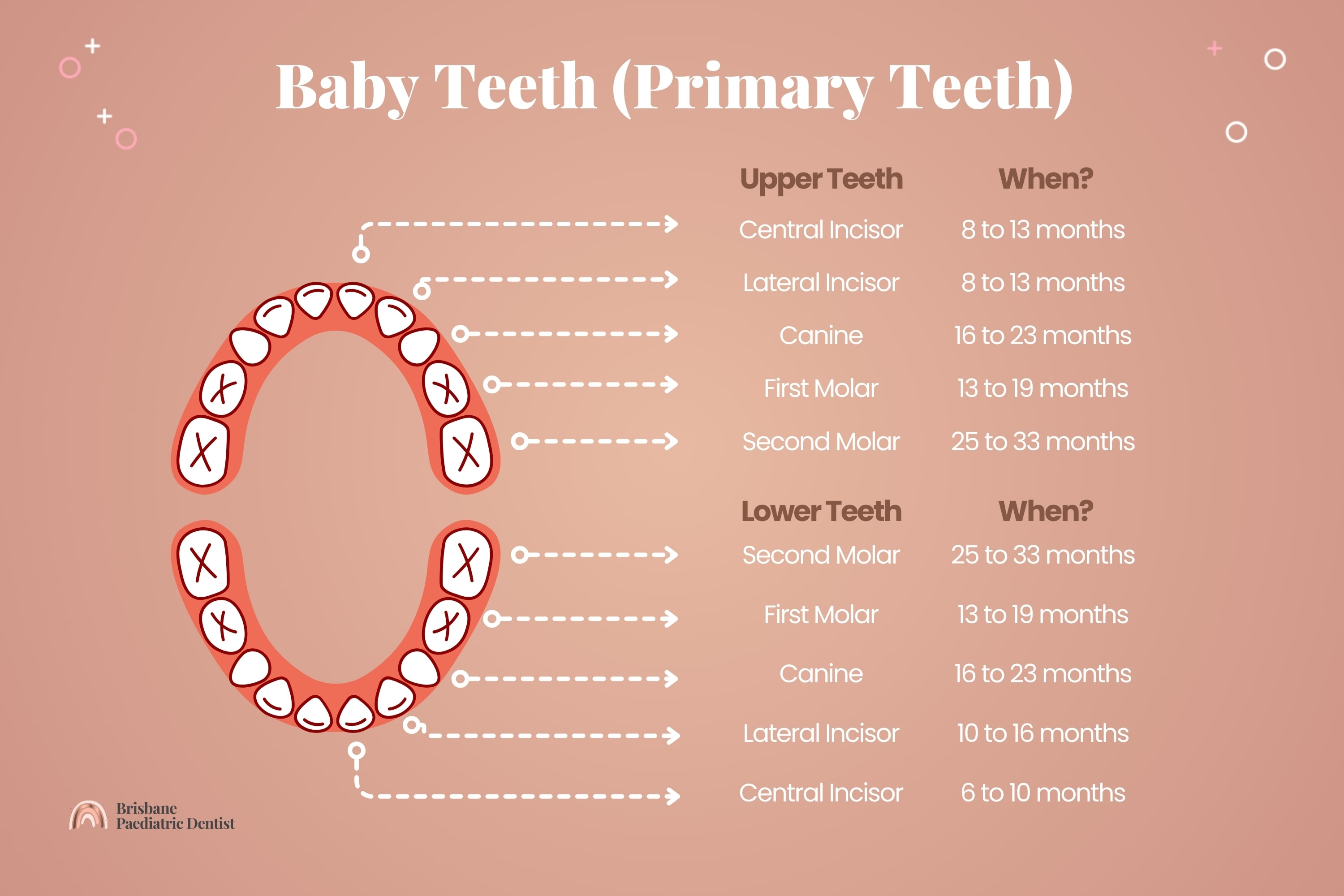
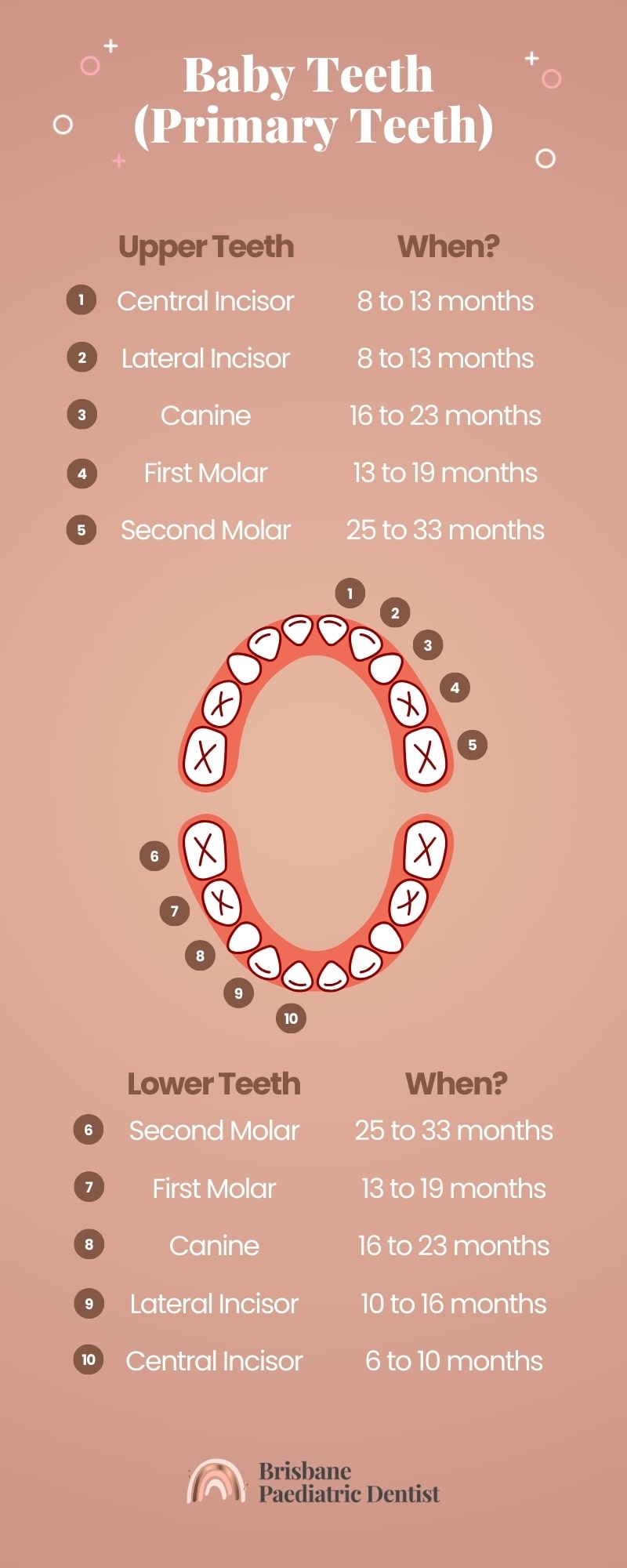
Baby teeth are also known as primary teeth, milk teeth, or deciduous teeth. These are the first teeth that your child grows!
How Many Teeth Does a Child Have?
There are 20 baby teeth in total. This first set of teeth comes out (erupts) over about 2 years. Wondering how many primary teeth fall out? All of them!
Types of Baby Teeth
These first 20 teeth consist of 8 incisors, 4 canines, and 8 molars. They’re split between the top and bottom jaws.
- Incisors: These teeth are sharp and help to “cut” food into easy-to-eat pieces.
- Canines: Fang-like, pointy teeth designed to rip and tear food into bits.
- Molars: Flat teeth that crush, grind, and chew food before swallowing.
When Do Baby Teeth Erupt?
Baby teeth start erupting from around 6 months of age. Every child is different, though, so they may come in a bit earlier or a bit later. Your child should have all their baby teeth by the time they are about 2 and a half or 3 years old.
Adult Teeth (Permanent Teeth)
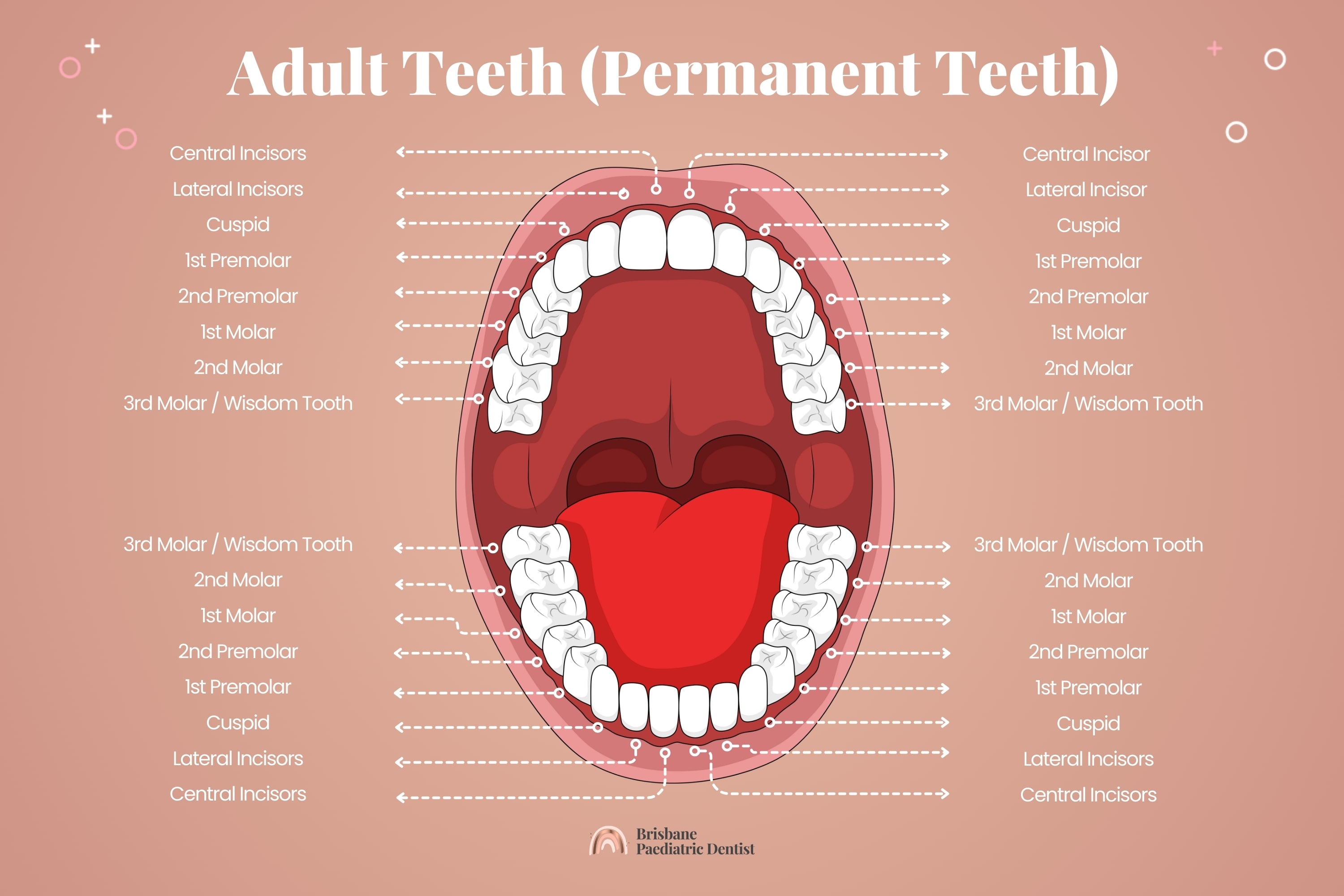
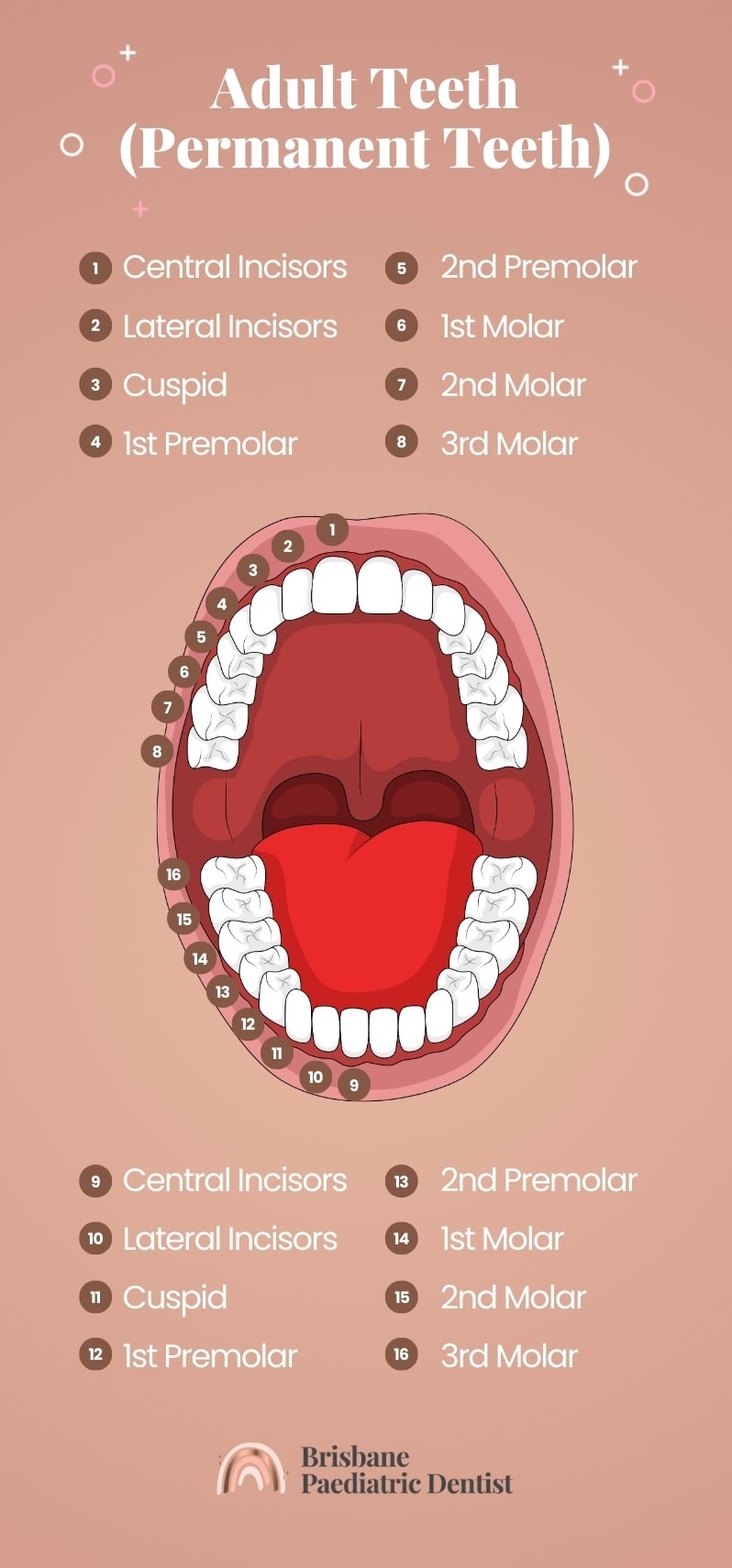
Your child will generally have a full set of permanent teeth (adult teeth) by the time they’re 13. Some children may not develop a full set until they’re in their 20s, but it’s less common.
How Many Adult Teeth are there?
A full set of adult teeth has 32 teeth in total. Once your child has these adult teeth, they will be there for life unless they fall out due to trauma or get removed.
Types of Adult Teeth
Your 32 permanent teeth consist of 8 incisors, 4 canines, 8 premolars, and 12 molars. Your child’s milk teeth will be replaced one for one, but they will also grow an additional 4 molars and 4 wisdom teeth (sometimes called third molars).
When do Adult Teeth erupt?
Your child’s first new teeth come out in the back of the mouth at around age 6. These are called the 6-year molars, and they won’t fall out. The remaining 32 adult teeth come in between the ages of 6 and 12.
- Central Incisors (front teeth): Between ages 6 and 7
- Lateral Incisors: Between age 7 and 8
- Canine Teeth and Molar Teeth: Between ages 9 and 12
Transition from Baby Teeth to Adult Teeth
For most children, transitioning from milk teeth to adult teeth is an easy process. However, parents can make it even easier by encouraging good oral health practices and keeping their children on a tooth-friendly diet.
Maintain Good Oral Hygiene
Teach your child the importance of looking after their teeth. Make sure they brush their teeth twice a day. You can also teach them how to floss as soon as they’re able to control the floss.
Nutrition for Healthy Teeth
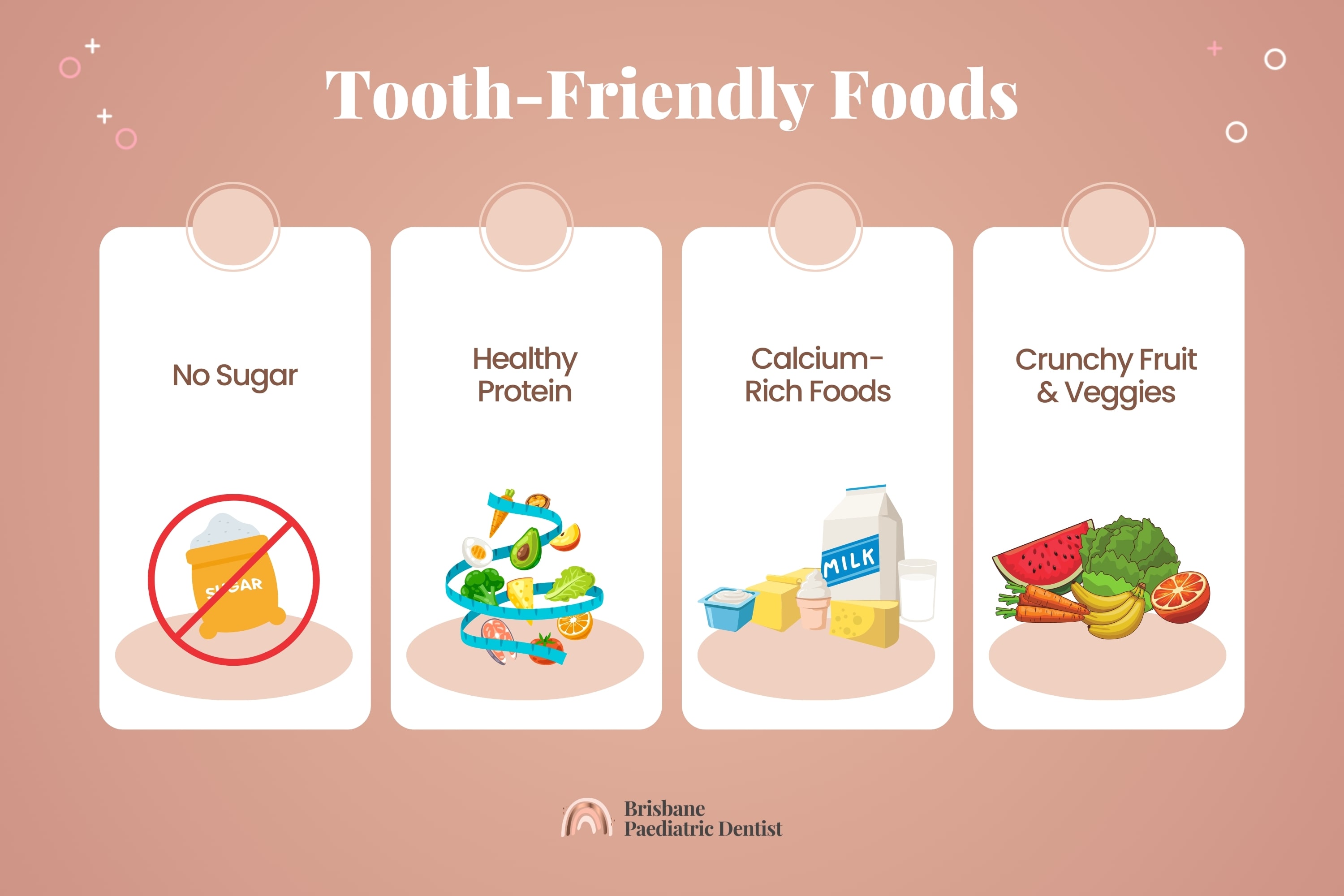
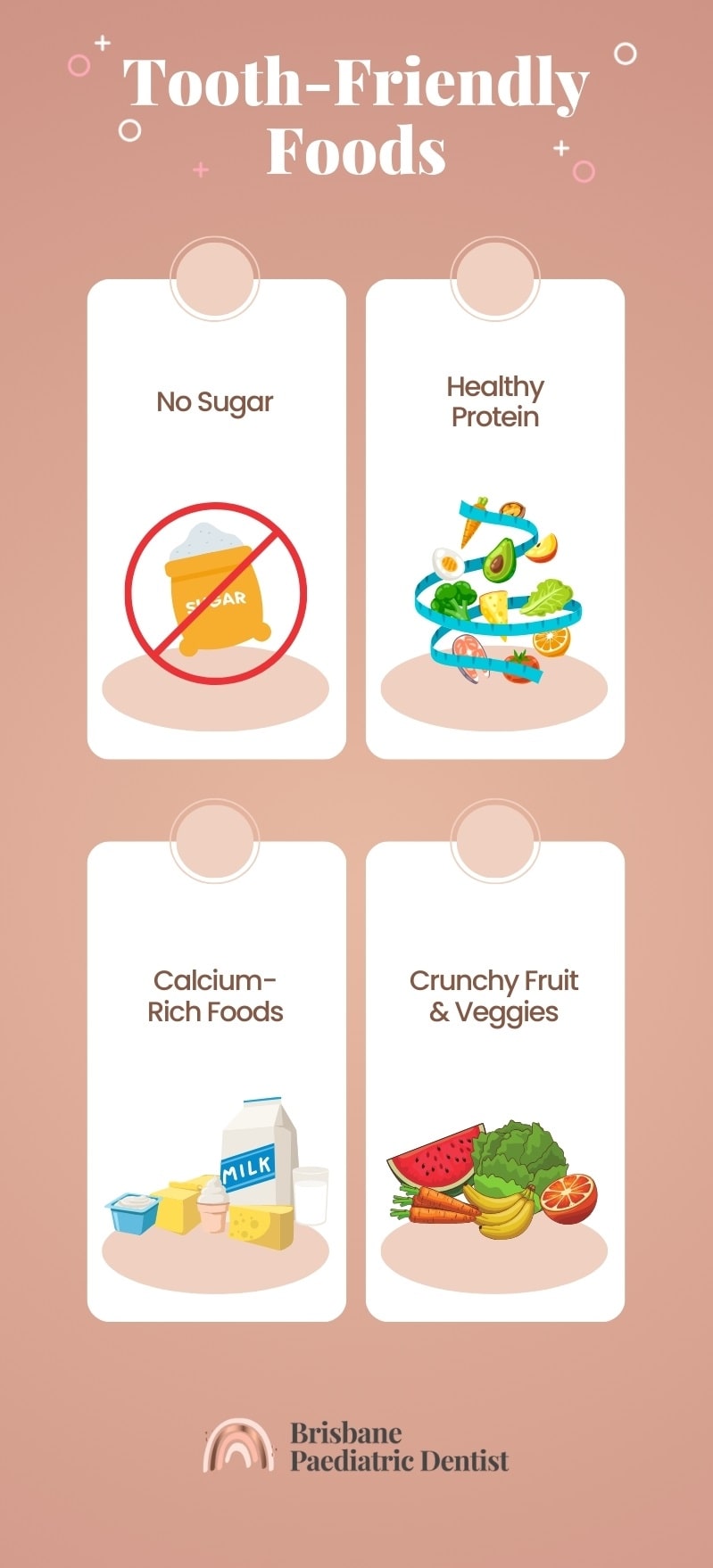
We highly recommend being careful about what you feed your child. While they’re bound to get some sugar in them at birthday parties and the school tuck shop, helping them maintain healthy eating can make a huge difference to their teeth and gums.
Reduce Sugar
Minimise candy snacks and sugary drinks. Too much sugar not only increases tooth decay, but it also increases inflammation. This can make your child more prone to gum disease and other health problems.
Healthy Protein
Lean white meat like turkey, chicken, and fish will help strengthen your child’s tooth enamel. Go easy on the red meat, which can create inflammation. Nuts and seeds are also great healthy protein sources.
High Calcium Foods
Milk, cheese, broccoli, and yoghurt are excellent sources of calcium, which strengthens teeth. Yoghurt also contains probiotics, which can neutralise bacteria, and lactic acid, which can reduce surface stains.
Crunchy Fruit and Veggies
Crunchy fruit and vegetables like carrots, celery, apples, and pears can help remove plaque from your child’s teeth. Plus, they contain healthy natural sugars, so try to get your kids into the habit of eating these kinds of healthy snacks!
When Should your Child See a Dentist?
You should take your child for their first dental visit around the age of 1 year. Unless there’s a problem, you won’t need to go to a dentist while your child’s baby teeth are erupting or while their permanent teeth are coming in.
Reasons to take your child to the dentist include:
- Dental pain
- Swelling in the mouth
- Lost teeth due to trauma
- Overcrowding of teeth
- Excessive bleeding in the mouth
How Many Teeth Does a Child Have FAQs
How many primary teeth fall out?
Children have 20 primary teeth (baby teeth) and all of them will fall out to make way for adult permanent teeth.
My child doesn’t have lateral incisors: Is it a problem?
Some children won’t have lateral incisors. This is a hereditary anomaly, so if a parent is missing their lateral incisors, the child may be too. In most cases, it’s not a problem, and it’s nothing to be worried about.
Is it normal for a child to lose teeth at age 5?
All children are different, so while most kids start losing teeth at age 6 or 7, some start losing them a little earlier. As long as your child has no pain, swelling, or uncontrollable bleeding along with their tooth loss, it should be fine.
Which children’s teeth don’t fall out?
Your child’s 6-year molars (the ones right at the back of the mouth) are their first permanent teeth and won’t fall out. These are visible teeth that erupt around age 6 and stay there forever. They differ from wisdom teeth, which may not even erupt at all.
Instilling good oral health habits in your child will also maintain the health of these teeth, as they’re the most susceptible to tooth decay.
If you found this article interesting you may also want to learn about pulpotomy – a dental procedure designed to save a primary tooth and “Dental Pulpectomy for Primary Teeth” and discover how this alternative approach can help save a child’s tooth.
Back to top: How many teeth does a child have?





